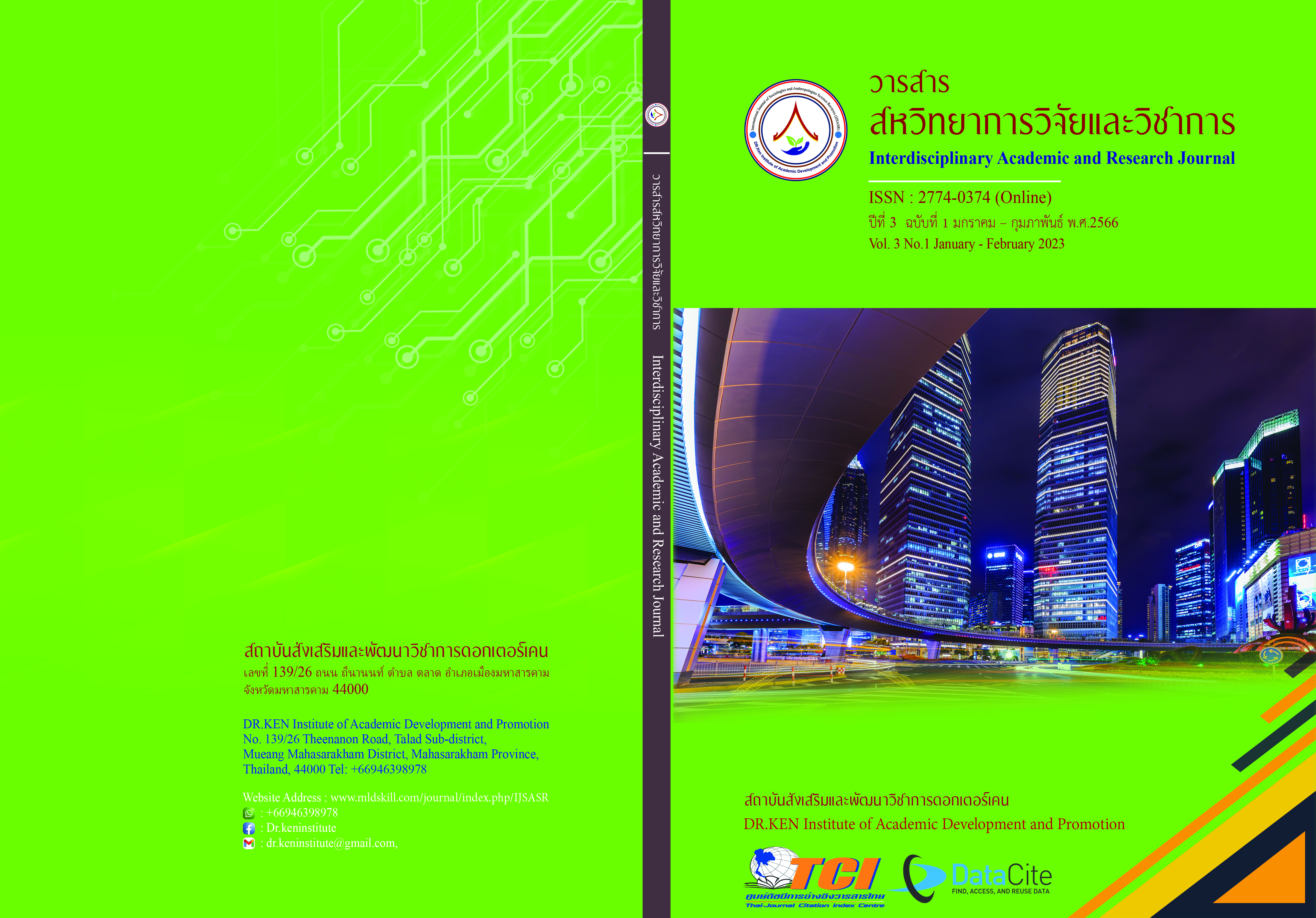Members’ Attitudes towards Decision to Use Loan Services from Sakon Nakhon Savings Cooperatives of the Government Officials of Educational Ministry, Co., Ltd.
DOI:
https://doi.org/10.14456/iarj.2023.42Keywords:
Attitude; , Decision Making for Service; , Credit; , Savings Cooperatives; , Civil Servants under the Ministry of Education Sakon Nakhon Co., Ltd.Abstract
The Government Savings Cooperative under the Ministry of Education, Sakon Nakhon Co., Ltd. provides loan services to government members who have financial difficulties or need money. The cooperative is open to members who wish to use credit services. Apply for a loan according to the rules of the cooperative. The selection of credit services for members of the Government Savings Cooperative may have different reasons or needs. The purpose of this research is (1) To study the level of attitude toward credit service selection and the level of decision-making in credit service selection of members of the Government Savings Cooperative. (2) To compare the decision to use credit services of members of the government savings cooperative classified by personal characteristics. And (3) To study the influence of attitudes on decision-making in choosing credit services of members of the government savings cooperative. The sample group consisted of 282 members of the Government Savings Cooperative under the Ministry of Education Sakon Nakhon Limited. The tool for collecting data is a questionnaire. The statistics used for data analysis were frequency, percentage, mean, standard deviation, t-test, one-way analysis of variance, and multiple regression analysis. The results showed that: (1) Attitudes towards decision-making in selecting credit services of the Government Savings Cooperative as a whole were at a high level. And decision-making in selecting credit services of government savings cooperatives as a whole was at a high level. (2) The decision to choose credit services of the members of the government savings cooperative found that there were differences according to the level of education with statistical significance at the .05 level, there were no differences in personal characteristics in terms of sex, age, marital status, work experience, and salary rate. And (3) Attitude factors on exposure to news through various media influence decision-making in choosing credit services at statistical significance at the .01 level. And personality factors influence decision-making in choosing credit services with statistical significance at the .05 level, which can together predict the level of decision-making in choosing credit services at 62.60% (R2Ad=.626). Attitude, experience, influence from family and friends, and marketing tools did not influence decision-making for credit service selection.
References
กรมส่งเสริมสหกรณ์. (2558). การส่งเสริมสหกรณ์ที่เกี่ยวข้องกับกฎหมายสหกรณ์. กรุงเทพฯ: โรงพิมพ์ชุมนุมสหกรณ์การเกษตรแห่งประเทศไทย จำกัด.
กิตติพัฒน์ รัตนพรวารีสกุล. (2556). ปัจจัยการตลาดบริการที่มีผลต่อการตัดสินใจในการเลือกใช้บริการสินเชื่อธุรกิจของลูกค้าธนาคารพาณิชย์สาขาหนึ่งในจังหวัดชลบุรี. งานนิพนธ์ บธ.ม. ชลบุรี: วิทยาลัยพาณิชยศาสตร์ มหาวิทยาลัยบูรพา.
ฉัตยาพร เสมอใจ. (2550). พฤติกรรมผู้บริโภค. กรุงเทพฯ: เอ็กซเปอร์เน็ท.
ชมพูนุท คาพุฒ. (2563). ปัจจัยภายในองค์กรและปัจจัยจูงใจในการฝากเงินที่ส่งผลต่อการเลือกใช้บริการเงินฝากของสมาชิกสหกรณ์ออมทรัพย์สาธารณสุขพิษณุโลก จำกัด. รายงานการวิจัย. พิษณุโลก: สาขาวิชาการจัดการประยุกต์ คณะวิทยาการจัดการ มหาวิทยาลัยราชภัฏพิบูลสงคราม.
นพพร ธนะชัยขันธ์. (2555). สถิติเบื้องต้นสำหรับการวิจัย. กรุงเทพฯ: วิทยพัฒน์.
นิติพล ภูตะโชติ. (2559). พฤติกรรมองค์การ Organizational Behavior. กรุงทพฯ: สำนักพิมพ์แห่งจุฬาลงกรณ์มหาวิทยาลัย.
นิภาวรรณ มุสิกสาร. (2563). ปัจจัยที่ที่มีผลต่อการเลือกใช้บริการของสมาชิกสหกรณ์ออมทรัพย์ กทม. จำกัด. รายงานการวิจัยสาขาการเงินและการธนาคาร กรุงเทพฯ: คณะบริหารธุรกิจ มหาวิทยาลัยรามคำแหง.
นิรันดร์ อ่อนนุ่ม. (2557). คุณภาพการให้บริการของสหกรณ์การเกษตรเมืองอุบลราชธานีจำกัด. การค้นคว้าอิสระ บธ.ม.. อุบลราชธานี: มหาวิทยาลัยราชภัฏอุบลราชธานี.
พรรณราย จิตเจนการ. (2558). สหกรณ์ออมทรัพย์สหภาพแรงงานรัฐวิสาหกิจการไฟฟ้านครหลวงจํากัด. การค้นคว้าแบบอิสระ บธ.ม.. กรุงเทพฯ: มหาวิทยาลัยธรรมศาสตร์.
รุ่งทิพย์ มณเทียร. (2560). ความพึงพอใจของสมาชิกที่มีต่อการให้บริการของสหกรณ์ออมทรัพย์ พนักงานมหาวิทยาลัยมหามกุฏราชวิทยาลัย จำกัด. สารนิพนธ์ บธ.ม.. กรุงเทพฯ: มหาวิทยาลัยกรุงเทพธนบุรี.
วริศรา แช่มช้อย และ พัฒน์ พัฒนรังสรรค์. (2563). ปัจจัยที่ส่งผลต่อการเลือกใช้บริการสินเชื่อที่อยู่ศัยกับธนาคาร อาคารสงเคราะห์ ในจังหวัดชลบุรี. 11th National and International Conference on Humanities and Social Sciences 25-26 May 2020, Phranakhon Rajabhat University, Bangkok, Thailand.
วิรัลฐิตา แจ้งเปล่า. (2558). การตัดสินใจในการเลือกใช้บริการด้านสินเชื่อของสหกรณ์ออมทรัพย์ครูชลบุรี จำกัด. งานนิพนธ์ บธ.ม. ชลบุรี: วิทยาลัยพาณิชยศาสตร์ มหาวิทยาลัยบูรพา.
สหกรณ์ออมทรัพย์ข้าราชการสังกัดกระทรวงศึกษาธิการสกลนคร จำกัด. (2564). ข้อมูลพื้นฐานสหกรณ์ออมทรัพย์ข้าราชการสังกัดกระทรวงศึกษาธิการสกลนคร. สกลนคร: สหกรณ์ออมทรัพย์ข้าราชการสังกัดกระทรวงศึกษาธิการสกลนคร จำกัด.
สำนักส่งเสริมและพัฒนาสหกรณ์ กรมส่งเสริมสหกรณ์. (2559). แนวทางปฏิบัติการบริหารความเสี่ยงของสหกรณ์ออมทรัพย์. กรุงเทพฯ: สำนักส่งเสริมและพัฒนาสหกรณ์ กรมส่งเสริมสหกรณ์.
สุดารัตน์ มีด้วง. (2558). ปัจจัยที่ส่งผลต่อการตัดสินใจเลือกใช้บริการสินเชื่อที่อยู่อาศัยของธนาคารออมสินสำนักราชดำเนิน เขตพระนคร กรุงเทพมหานคร. วิทยานิพนธ์ บธ.ม. กรุงเทพฯ: มหาวิทยาลัยศิลปากร.
อารมย์ กัณหา และพันธ์ศักดิ์ ภูทอง. (2558). การศึกษาผลการดำเนินงานสหกรณ์ออมทรัพย์ข้าราชการ สังกัดกระทรวงศึกษาธิการอุบลราชธานี จำกัด. อุบลราชธานี: สหกรณ์ออมทรัพย์ข้าราชการ สังกัดกระทรวงศึกษาธิการอุบลราชธานี.
ฮุสนุล หะยีดาราโอะ. (2558). ความพึงพอใจของสมาชิกต่อผลิตภัณฑ์และการให้บริการของสหกรณ์อิสลาม อิบนูอัฟฟาน จำกัด ในจังหวัดปัตตานี. วิทยานิพนธ์ ศศ.ม. สาขาวิชาอิสลามศึกษา. กรุงเทพฯ: มหาวิทยาลัยสงขลานครินทร์.
Krejcie, R.V., & D.W. Morgan. (1970). “Determining Sample Size for Research Activities”. Educational and Psychological Measurement. 30(3), 607 – 610.
Downloads
Published
How to Cite
Issue
Section
License
Copyright (c) 2023 ภูริกา ศรีดาแก้ว, ละมัย ร่มเย็น, สัญญาศรณ์ สวัสดิ์ไธสง

This work is licensed under a Creative Commons Attribution-NonCommercial-NoDerivatives 4.0 International License.
Copyright on any article in the Interdisciplinary Academic and Research Journal is retained by the author(s) under the under the Creative Commons Attribution-NonCommercial-NoDerivatives 4.0 International License. Permission to use text, content, images, etc. of publication. Any user to read, download, copy, distribute, print, search, or link to the full texts of articles, crawl them for indexing, pass them as data to software, or use them for any other lawful purpose. But do not use it for commercial use or with the intent to benefit any business.
















.png)


